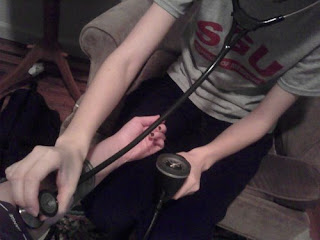
photo credit-atomicshark
creative commons license
Well, we're off, on what promises to be a great vacation (holiday). We had a mostly good day, with but a small (but typical) interchange at the motel pool after we checked in.
The pool was packed, and noisy. There were kids everywhere. Buddy Boy and Sweet Pea jumped right in, swam around some, and seemed to be having fun.
As I was watching Buddy Boy, he approached a group of kids at one end of the pool. It was apparent that they all knew each other, and were goofing around with each other a bit. Buddy Boy pretty much just inserted himself in the middle of the group and tried to start interacting with them. I couldn't hear what was being said, but then it appeared that (perhaps) they were engaging him and including him in their goofing around. Then I noticed a bit of shoving going on, and the next thing I know Buddy Boy's being shoved a bit forcefully by one of the kids. It turns out that after getting pushed lightly a bit, Buddy Boy kicked him in the groin below the surface of the water. I guess I'd be upset, too. By this time I could tell that something was definitely wrong, and Liz started towards that end of the pool to see what was up (I asked Liz to go, because there were a group of mothers down there, and I thought that perhaps a female touch would go over better than me going down there). Before she gets there the mom of the other boy is pointing at Buddy Boy and shouting that Buddy Boy kicked her son in his private parts (and of course the pool gets pretty quiet, and everyone turns to pay attention).
Buddy Boy, having been shoved a bit hard, comes out of the pool crying loudly. So now the other mother is starting to shout, and Buddy Boy is getting louder. Liz pulled the "A" card (you know, sometimes my son overreacts a little, he's autistic).
Amazingly, it worked. The other mother abruptly stopped, said she understood, and sat back down. We quieted Buddy Boy down, and the kids got back to playing in the water.
Liz says that this incident was pretty typical for Buddy Boy, when he doesn't have someone right by his side facilitating his interactions and intervening. I must admit that I haven't seen things escalate so quickly in the past (okay, maybe I have selective memory), but she sees him more at school, and interacts with his teachers more. Evidently stuff like this happens during recess at school on a fairly regular basis.
Liz and I talked, and we think it's because he just can't read the situation. He doesn't understand how groups of kids that already know each other don't necessarily want someone else to insert themselves into their group. He doesn't get their signals when they tell him to nicely get lost. He doesn't know the difference between gentle playfulness between close friends, and him being a stranger pushing just "that" much harder than they are (which then sets them off, to his surprise and dismay, which escalates his response).
We've tried explanations (which he doesn't want to listen to-"I KNOW"), we've tried a little role playing, which he also doesn't want to partake of. We coach ahead of time, and I always struggle with how far to let him go on his own. I don't want him to have bad experiences, but I also know that eventually he needs to learn to navigate on his own (and it does work, sometimes).
I blame myself for tonight. I should have recognized that the pool was much too crowded, the kids perhaps too tired, and me too lazy to change into a swimsuit and instead sat on the side. I wish I was a bit more like Emily.







